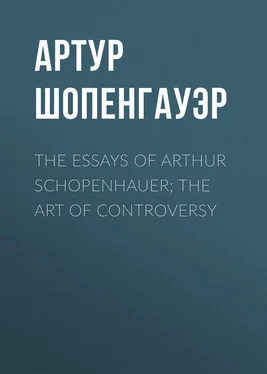Артур Шопенгауэр - The Essays of Arthur Schopenhauer; the Art of Controversy
Здесь есть возможность читать онлайн «Артур Шопенгауэр - The Essays of Arthur Schopenhauer; the Art of Controversy» — ознакомительный отрывок электронной книги совершенно бесплатно, а после прочтения отрывка купить полную версию. В некоторых случаях можно слушать аудио, скачать через торрент в формате fb2 и присутствует краткое содержание. Жанр: Философия, literature_19, foreign_antique, foreign_prose, на английском языке. Описание произведения, (предисловие) а так же отзывы посетителей доступны на портале библиотеки ЛибКат.
- Название:The Essays of Arthur Schopenhauer; the Art of Controversy
- Автор:
- Жанр:
- Год:неизвестен
- ISBN:нет данных
- Рейтинг книги:3 / 5. Голосов: 1
-
Избранное:Добавить в избранное
- Отзывы:
-
Ваша оценка:
- 60
- 1
- 2
- 3
- 4
- 5
The Essays of Arthur Schopenhauer; the Art of Controversy: краткое содержание, описание и аннотация
Предлагаем к чтению аннотацию, описание, краткое содержание или предисловие (зависит от того, что написал сам автор книги «The Essays of Arthur Schopenhauer; the Art of Controversy»). Если вы не нашли необходимую информацию о книге — напишите в комментариях, мы постараемся отыскать её.
The Essays of Arthur Schopenhauer; the Art of Controversy — читать онлайн ознакомительный отрывок
Ниже представлен текст книги, разбитый по страницам. Система сохранения места последней прочитанной страницы, позволяет с удобством читать онлайн бесплатно книгу «The Essays of Arthur Schopenhauer; the Art of Controversy», без необходимости каждый раз заново искать на чём Вы остановились. Поставьте закладку, и сможете в любой момент перейти на страницу, на которой закончили чтение.
Интервал:
Закладка:
XIII
To make your opponent accept a proposition, you must give him the counter-proposition as well, leaving him his choice of the two; and you must render the contrast as glaring as you can, so that to avoid being paradoxical he will accept the proposition, which is thus made to look quite probable. For instance, if you want to make him admit that a boy must do everything that his father tells him to do, ask him "whether in all things we must obey or disobey our parents." Or, if a thing is said to occur "often," ask whether by "often" you are to understand few or many cases; and he will say "many." It is as though you were to put grey next black, and call it white; or next white, and call it black.
XIV
This, which is an impudent trick, is played as follows: When your opponent has answered several of your questions without the answers turning out favourable to the conclusion at which you are aiming, advance the desired conclusion, – although it does not in the least follow, – as though it had been proved, and proclaim it in a tone of triumph. If your opponent is shy or stupid, and you yourself possess a great deal of impudence and a good voice, the trick may easily succeed. It is akin to the fallacy non causae ut causae .
XV
If you have advanced a paradoxical proposition and find a difficulty in proving it, you may submit for your opponent's acceptance or rejection some true proposition, the truth of which, however, is not quite palpable, as though you wished to draw your proof from it. Should he reject it because he suspects a trick, you can obtain your triumph by showing how absurd he is; should he accept it> you have got reason on your side for the moment, and must now look about you; or else you can employ the previous trick as well, and maintain that your paradox is proved by the proposition which he has accepted. For this an extreme degree of impudence is required; but experience shows cases of it, and there are people who practise it by instinct.
XVI
Another trick is to use arguments ad hominem , or ex concessis 14 14 The truth from which I draw my proof may he either (1) of an objective and universally valid character; in that case my proof is veracious, secundum veritatem ; and it is such proof alone that has any genuine validity. Or (2) it may be valid only for the person to whom I wish to prove my proposition, and with whom I am disputing. He has, that is to say, either taken up some position once for all as a prejudice, or hastily admitted it in the course of the dispute; and on this I ground my proof. In that case, it is a proof valid only for this particular man, ad kominem. I compel my opponent to grant my proposition, but I fail to establish it as a truth of universal validity. My proof avails for my opponent alone, but for no one else. For example, if my opponent is a devotee of Kant's, and I ground my proof on some utterance of that philosopher, it is a proof which in itself is only ad hominem . If he is a Mohammedan, I may prove my point by reference to a passage in the Koran, and that is sufficient for him; but here it is only a proof ad hominem ,
When your opponent makes a proposition, you must try to see whether it is not in some way – if needs be, only apparently – inconsistent with some other proposition which he has made or admitted, or with the principles of a school or sect which he has commended and approved, or with the actions of those who support the sect, or else of those who give it only an apparent and spurious support, or with his own actions or want of action. For example, should he defend suicide, you may at once exclaim, "Why don't you hang yourself?" Should he maintain that Berlin is an unpleasant place to live in, you may say, "Why don't you leave by the first train?" Some such claptrap is always possible.
XVII
If your opponent presses you with a counter-proof, you will often be able to save yourself by advancing some subtle distinction, which, it is true, had not previously occurred to you; that is, if the matter admits of a double application, or of being taken in any ambiguous sense.
XVIII
If you observe that your opponent has taken up a line of argument which will end in your defeat, you must not allow him to carry it to its conclusion, but interrupt the course of the dispute in time, or break it off altogether, or lead him away from the subject, and bring him to others. In short, you must effect the trick which will be noticed later on, the mutatio controversiae . (See § xxix.)
XIX
Should your opponent expressly challenge you to produce any objection to some definite point in his argument, and you have nothing much to say, you must try to give the matter a general turn, and then talk against that. If you are called upon to say why a particular physical hypothesis cannot be accepted, you may speak of the fallibility of human knowledge, and give various illustrations of it.
XX
When you have elicited all your premisses, and your opponent has admitted them, you must refrain from asking him for the conclusion, but draw it at once for yourself; nay, even though one or other of the premisses should be lacking, you may take it as though it too had been admitted, and draw the conclusion. This trick is an application of the fallacy non causae ut causae
Конец ознакомительного фрагмента.
Текст предоставлен ООО «ЛитРес».
Прочитайте эту книгу целиком, купив полную легальную версию на ЛитРес.
Безопасно оплатить книгу можно банковской картой Visa, MasterCard, Maestro, со счета мобильного телефона, с платежного терминала, в салоне МТС или Связной, через PayPal, WebMoney, Яндекс.Деньги, QIWI Кошелек, бонусными картами или другим удобным Вам способом.
1
He speaks of [Greek: dyscherelai logicai], that is, "difficult points," [Greek: protasis logicae aporia logicae]
2
Cic. in Lucullo: Dialecticam inventam esse, veri et falsi quasi disceptatricem. Topica , c. 2: Stoici enim judicandi vias diligenter persecuti sunt, ea scientia, quam Dialecticen appellant . Quint., lib. ii., 12: Itaque haec pars dialecticae, sive illam disputatricem dicere malimus ; and with him this latter word appears to be the Latin equivalent for Dialectic. (So far according to "Petri Rami dialectica, Audomari Talaei praelectionibus illustrata." 1569.)
3
According to Diogenes Laertius, v., 28, Aristotle put Rhetoric and Dialectic together, as aiming at persuasion, [Greek: to pithanon]; and Analytic and Philosophy as aiming at truth. Aristotle does, indeed, distinguish between (1) Logic , or Analytic, as the theory or method of arriving at true or apodeictic conclusions; and (2) Dialectic as the method of arriving at conclusions that are accepted or pass current as true, [Greek: endoxa] probabilia ; conclusions in regard to which it is not taken for granted that they are false, and also not taken for granted that they are true in themselves, since that is not the point. What is this but the art of being in the right, whether one has any reason for being so or not, in other words, the art of attaining the appearance of truth, regardless of its substance? That is, then, as I put it above.
Читать дальшеИнтервал:
Закладка:
Похожие книги на «The Essays of Arthur Schopenhauer; the Art of Controversy»
Представляем Вашему вниманию похожие книги на «The Essays of Arthur Schopenhauer; the Art of Controversy» списком для выбора. Мы отобрали схожую по названию и смыслу литературу в надежде предоставить читателям больше вариантов отыскать новые, интересные, ещё непрочитанные произведения.
Обсуждение, отзывы о книге «The Essays of Arthur Schopenhauer; the Art of Controversy» и просто собственные мнения читателей. Оставьте ваши комментарии, напишите, что Вы думаете о произведении, его смысле или главных героях. Укажите что конкретно понравилось, а что нет, и почему Вы так считаете.












